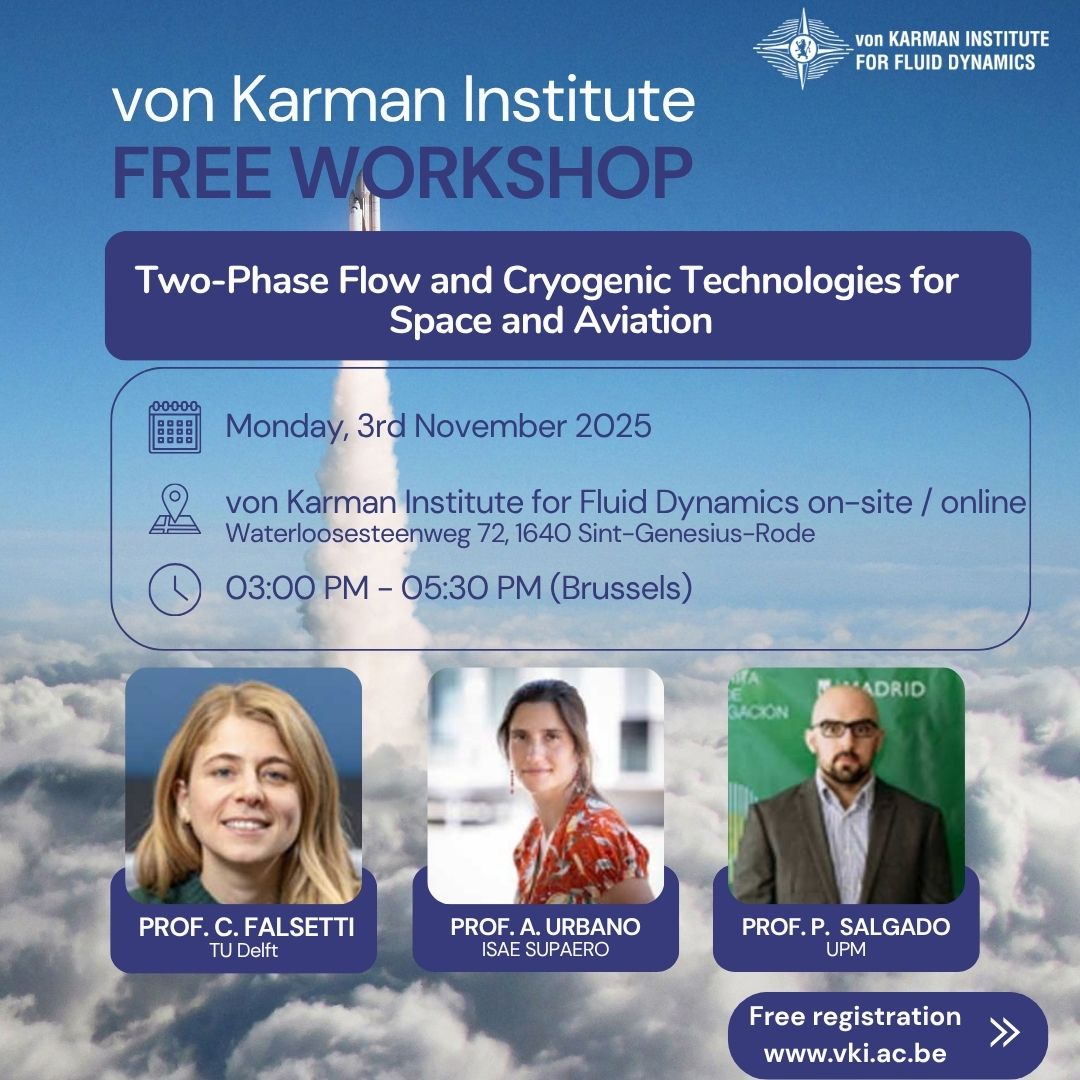
This free workshop brings together experts in aerospace thermal sciences to discuss current advances in two-phase flow, cryogenic technologies, and space operations. The talks will cover numerical and experimental approaches to boiling and cavitation in microgravity, the role of cryogenic two-phase phenomena in enabling sustainable aviation, and the activities and research lines of the Spanish User Support and Operations Centre (E-USOC). Together, these perspectives highlight the fundamental and applied challenges of fluid and thermal management across future space and aviation systems.
Workshop organizers: P. Marques and M. A. Mendez
Registration deadline: 30 October 2025
Monday 3 November 2026
15:00 – 15:45 - From Boiling to Cryogenics: The Role of Two-Phase Flow in Sustainable Aviation
Prof. Chiara Falsetti, TU Delft, The Netherlands
Abstract:Global energy demand and the urgent need to reduce environmental impact are driving radical changes in aerospace research. Novel aircraft designs, alternative fuels, and advanced propulsion concepts, ranging from battery-powered systems to hydrogen-based engines, are being developed to decarbonize aviation. The transition to sustainable flight, however, introduces new thermal and phase-change challenges. Future aircraft will generate high heat loads and employ cryogenic propellants that tend to evaporate, complicating safe storage and fuel delivery. Managing these conditions requires a fundamental rethinking of thermal and fuel management strategies. Here, we highlight how research in two-phase flow and thermal management, originally developed in the contexts of electronics cooling and nuclear energy systems, provide powerful insights for enabling future aviation systems. In particular, the study of boiling heat transfer, critical heat flux limits, and cryogenic phase-change dynamics become directly relevant to next generation aircraft.
15:45 – 16:30 On the impact of contact line evaporation on bubble growth in microgravity
Prof. Annafederica Urbamo, ISAE-SUPAERO, Toulouse, France
Abstract: Cryogenic propellants (H₂, CH₄, O₂) are used for space transportation and must be stored for long periods in microgravity (upper stage tanks during ballistic phases, or in future space depot). Variations in temperature and pressure can induce nucleate boiling and cavitation at the wall, with strong consequences for wall heat transfer behaviour and, ultimately, propellant loss. These phenomena are difficult to characterize, not least because of their spatial and temporal multiscale nature. Bubbles have a size of the order of the millimetre, and their growth is driven by phase change which depends on the thermal boundary layer around the bubble, in the 10 μm scale. At the contact line, the nanoregion (length under 100 nm) can have a major impact. Direct numerical simulations, including appropriate modeling for the nanoregion, can be used to study these phenomena at the bubble scale in order to improve our understanding and possibly provide correlations or models for use at larger scales. In the present talk, the numerical approaches developed to study phase change problems with contact lines in incompressible (boiling) and compressible (cavitation) conditions will be revised. The approach implemented to account for the nanoregion at the subgrid level will be detailed. The seminar will focus on two main applications in microgravity, featuring conjugate heat transfer with a wall and contact lines: nucleate boiling in a subcooled liquid and pool cavitation. Comparison with experimental data and parametric analysis will demonstrate the major impact of the nanoregion in both configurations in terms of heat transfer and bubble shape (apparent contact angle). Eventually, the analysis of the results will allow extracting models for bubble growth and associated heat transfer flux that are used in large-scale simulations featuring multiple bubbles.
16:30 – 16:35 Short break
16:35 – 17:20 Spanish User Support and Operations Centre (E-USOC): activities and research lines
Prof. Pablo Salgado, UPM, Madrid, Spain
Abstract: This presentation outlines the mission and activities of the Spanish User Support and Operations Centre (E-USOC), a UPM center dedicated to space science and technology that prepares, executes, and analyzes ESA experiments on the ISS — particularly those conducted in NASA’s Microgravity Science Glovebox. It highlights past, current and forthcoming ISS experiments. The talk also introduces the HRE Science Data Center, which archives, valorizes, and publishes microgravity research data, enabling broader scientific reuse. Research lines span thermocapillary-enhanced phase change materials, fluid control and sloshing mitigation in microgravity and spacecraft attitude control, where fuzzy-logic algorithms demonstrate superior cost-accuracy and low-power performance versus PID, validated via simulation and ground tests. Finally, the ESAT educational CubeSat platform is presented as a teaching and research tool adopted by over 50 institutions worldwide, supporting hands-on training from UPM’s master’s program to ESA Academy activities.
17:20 – 17:30 Closing Discussion
